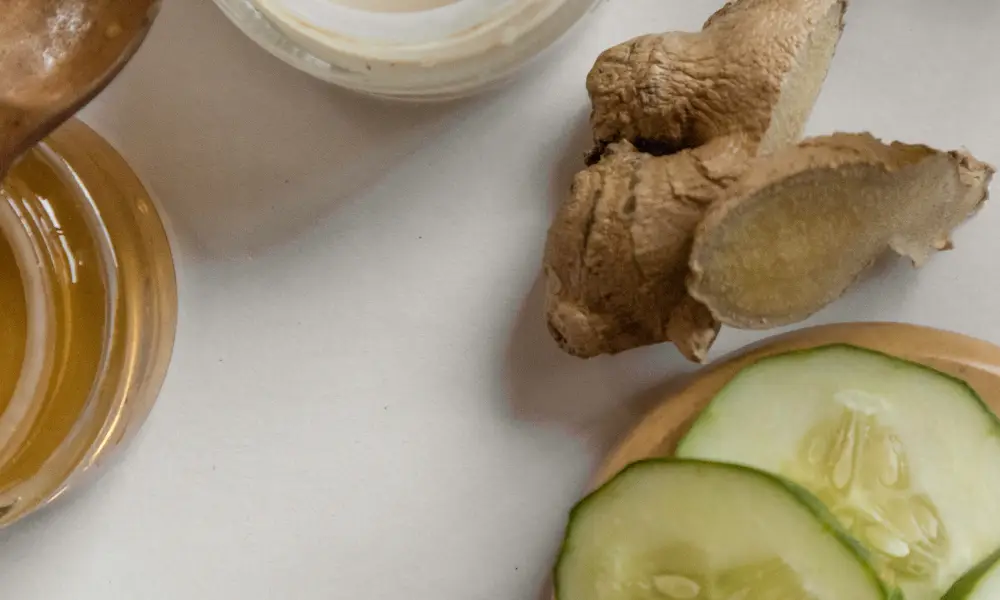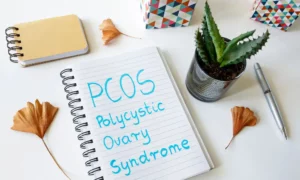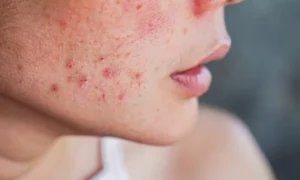Polycystic Ovary Syndrome and anovulation, a condition where the ovaries fail to release eggs regularly, can be significant limitations for those aiming to conceive. The prevalence of PCOS has risen, affecting millions worldwide. Understanding the dynamics of PCOS and anovulation is crucial for those seeking effective solutions. In this article, we’ll delve into the intricacies of PCOS, and the symptoms posed by anovulation, and explore natural treatment options that offer a ray of hope to individuals seeking to overcome these obstacles.
Contents
What Is The Relationship Between PCOS And Anovulation? 
Polycystic Ovary Syndrome (PCOS) and anovulation are closely related terms, as anovulation is a common characteristic of PCOS.
PCOS is a hormonal disorder that affects people with ovaries, often during their reproductive years. It is characterized by a combination of symptoms, including irregular menstrual cycles, high levels of androgens (male hormones) in the body, and the presence of small cysts on the ovaries.
Anovulation, on the other hand, refers to the absence of ovulation, which is the release of an egg from the ovary. In a normal menstrual cycle, ovulation is a crucial process for fertility, as it allows the egg to be available for fertilization. However, in PCOS, hormonal imbalances can disrupt the regular ovulatory process.
In individuals with PCOS, the ovaries may not consistently release eggs, leading to irregular or absent menstrual periods. The hormonal disturbances associated with PCOS can result in anovulation, contributing to difficulties in conceiving for those trying to get pregnant.
It’s important to note that not all individuals with PCOS experience the same symptoms, and the severity of anovulation can vary. Some may have irregular periods, while others may experience more pronounced fertility challenges due to infrequent or absent ovulation.
Causes Of Anovulation In PCOS
Anovulation in Polycystic Ovary Syndrome (PCOS) is primarily caused by hormonal imbalances. Several factors contribute to the disruption of the normal ovulatory process in individuals with PCOS. The key hormonal factors involved include:
- Insulin Resistance: Many individuals with PCOS have insulin resistance, a condition where the body’s cells do not respond effectively to insulin. This can lead to elevated insulin levels, which in turn stimulate the ovaries to produce more androgens (male hormones) such as testosterone. The increased androgen levels can interfere with the regular development and release of eggs.
- Hyperandrogenism: Elevated levels of androgens, including testosterone, are common in PCOS. Excessive androgens can disrupt the normal hormonal balance, affecting the maturation and release of eggs from the ovaries.
- Luteinizing Hormone (LH) Imbalance: In a typical menstrual cycle, there is a surge in luteinizing hormone (LH) that triggers ovulation. In PCOS, the ratio of LH to follicle-stimulating hormone (FSH) is often elevated. This altered ratio can lead to abnormal follicle development and impair the release of a mature egg.
- Follicular Arrest: In PCOS, multiple small follicles may develop in the ovaries, but they often fail to mature into dominant follicles that can release eggs. This condition is referred to as follicular arrest and is a common cause of anovulation in PCOS.
- Abnormalities in Gonadotropin-Releasing Hormone (GnRH) Pulsatility: GnRH is a hormone that plays a crucial role in regulating the menstrual cycle. In PCOS, disruptions in the pulsatile release of GnRH can contribute to irregular ovulation or anovulation.
It’s important to note that these factors are interconnected, and the exact mechanisms underlying anovulation in PCOS may vary among individuals. Additionally, the degree of hormonal imbalance can differ, leading to variations in symptoms and fertility challenges.
Symptoms Of Anovulation In PCOS 
Anovulation in PCOS can manifest through various symptoms, reflecting the irregularities in the menstrual cycle and hormonal imbalances associated with this condition. Some common symptoms of anovulation in PCOS include:
- Irregular Menstrual Cycles: Anovulation often leads to irregular or unpredictable menstrual cycles. Women with PCOS may experience infrequent periods or cycles that are significantly longer or shorter than the typical 28-day cycle.
- Amenorrhea: Some individuals with PCOS may experience amenorrhea, which is the absence of menstrual periods for an extended period. This can result from the lack of ovulation.
- Ovulatory Dysfunction Signs: Women with anovulation in PCOS may not experience typical signs of ovulation, such as changes in cervical mucus consistency or the sensation of pelvic pain known as mittelschmerz.
- Difficulty Conceiving: Anovulation is a significant factor contributing to infertility in women with PCOS. Irregular ovulation or the absence of ovulation can make it challenging to conceive without medical intervention.
- Hirsutism: Elevated levels of androgens in PCOS can lead to hirsutism, the excessive growth of facial and body hair. This is a result of the increased sensitivity of hair follicles to androgens.
- Acne and Oily Skin: Androgen excess in PCOS can contribute to acne and oily skin, as these hormones play a role in the regulation of sebum (skin oil) production.
- Thinning Hair or Hair Loss: Some women with PCOS may experience thinning of hair on the scalp or even male-pattern baldness due to the influence of androgens on hair follicles.
- Weight Irregularities: PCOS is often associated with weight-related issues. Some individuals may experience weight gain, especially around the abdominal area, while others may struggle with difficulty losing weight.
It’s important to note that not all individuals with PCOS will experience the same symptoms, and the severity of symptoms can vary.
Natural Treatment Options For Anovulation In PCOS
While medical interventions are often recommended for managing anovulation in Polycystic Ovary Syndrome (PCOS), there are also some lifestyle changes and natural approaches that may help improve symptoms and support reproductive health. It’s important to note that these suggestions should complement, not replace, guidance from healthcare professionals. Here are some natural treatment options for anovulation in PCOS:
Healthy Diet
- Low-Glycemic Diet: Focus on a diet with a low glycemic index to help manage insulin resistance. This involves choosing whole, unprocessed foods and avoiding refined carbohydrates and sugars.
- Balanced Macronutrients: Ensure a balance of carbohydrates, proteins, and healthy fats in your diet to support overall health and hormone regulation.
Regular Exercise
Engage in regular physical activity to help improve insulin sensitivity and manage weight. Aim for a combination of aerobic exercise and strength training. Consult with a healthcare professional before starting a new exercise regimen, especially if you have any underlying health conditions.
Stress Management
Chronic stress can contribute to hormonal imbalances. Incorporate stress-reducing practices such as meditation, yoga, deep breathing exercises, or mindfulness into your daily routine.
Supplements
Some supplements may be beneficial, but it’s crucial to consult with a healthcare professional before starting any new regimen.
Potential supplements include
- Inositol: Inositol is a naturally occurring substance in your body that assists insulin in regulating blood sugar levels. There are nine different structures of inositol, referred to as isomers.
- Omega-3 Fatty Acids: Found in fish oil, they may have anti-inflammatory and hormonal balancing effects.
- Vitamin D: Adequate levels of vitamin D are important for overall health and may play a role in reproductive function.
Herbal Remedies
Certain herbs are believed to have potential benefits, but scientific evidence is limited. Examples include spearmint tea (thought to have anti-androgenic effects) and chasteberry (Vitex), which is sometimes used to regulate menstrual cycles.
Adequate Sleep
Ensure you get enough quality sleep, as lack of sleep can contribute to hormonal imbalances.
Limit Exposure to Endocrine Disruptors
Minimize exposure to environmental toxins and endocrine-disrupting chemicals, which can interfere with hormonal balance.
It’s essential to work closely with a healthcare professional, preferably one with experience in reproductive endocrinology when exploring natural treatment options for anovulation in PCOS. They can provide personalized guidance based on your specific health needs and goals.
Benefits Of Natural Treatments 
Natural treatments for anovulation in PCOS can offer several potential benefits, especially when used in conjunction with medical interventions or under the guidance of healthcare professionals. It’s important to note that individual responses may vary, and these benefits are not universal for everyone. Here are some potential benefits of incorporating natural treatments:
- Hormonal Balance: Natural treatments help in balancing hormones, regulating menstrual cycles, and promoting ovulation.
- Improved Insulin Sensitivity: Lifestyle changes, like a healthy diet and regular exercise, enhance the body’s response to insulin, aiding in better blood sugar control.
- Weight Management: Adopting a balanced lifestyle supports weight control, crucial for managing PCOS symptoms and restoring regular ovulation.
- Reduced Inflammation: Some natural approaches, such as omega-3 fatty acids, may have anti-inflammatory effects, positively impacting overall health.
- Enhanced Fertility: Addressing anovulation through natural methods can improve fertility, increasing the chances of conception.
- Stress Reduction: Incorporating stress management techniques contributes to hormonal balance and supports reproductive health.
- Overall Well-Being: Natural treatments focus on holistic well-being, benefiting both physical and mental health.
- Cost-Effective and Accessible: Many natural strategies are affordable and easily accessible, making them practical for daily life.
- Empowerment: Embracing natural treatments empowers individuals to actively participate in their health, promoting a sense of control and well-being.
Conclusion
In the journey to combat PCOS-related anovulation, natural treatments offer a promising alternative. By addressing the root causes, minimizing side effects, and promoting overall well-being, individuals can find renewed hope on their path to conception.
If you are facing PCOS related issues, PCOS treatment at HerMantra can help. Book your free trial online pcos treatment session now.





